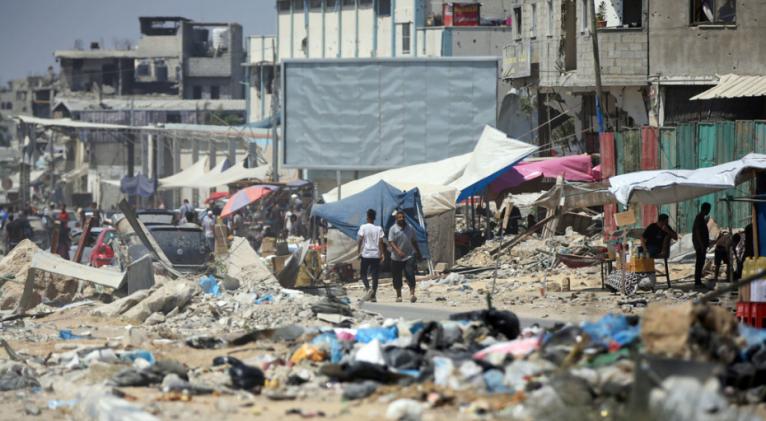‘Endless nightmare’ of death and destruction in Gaza, UN officials tell Security Council
especiales

Senior UN officials on Friday reiterated the catastrophic humanitarian situation in Gaza, and escalating threat to aid workers, urging immediate action prevent further deterioration.
Muhannad Hadi, Deputy UN Special Coordinator for the Middle East Peace Process, and Antonia De Meo, Deputy Commissioner-General of the UN agency assisting Palestinian refugees, UNRWAOpens in new window, briefed the Security CouncilOpens in new window on the dire situation.
“For nearly 10 months now, Palestinians and Israelis have lived through untold suffering, grief, sorrow, and loss. More than two million people in Gaza remain trapped in an endless nightmare of death and destruction on a staggering scale,” Ms. De Meo toldOpens in new window ambassadors.
“Their lives are dominated by fear, thirst, hunger, disease, dehumanization, lack of basic sanitation, and repeated displacement. It is a relentless and often hourly struggle, day in and day out. Famine remains a risk, including in southern Gaza. Communicable diseases are on the rise.”
Antonia De Meo briefing the Security Council.
Deeply traumatized children
The situation is particularly alarming for the 625,000 children in the enclave, deeply traumatized and with their futures at risk.
Most UNRWA schools – places of learning for about half of the children, and now used as shelters by the displaced – have been destroyed or severely damaged in Israeli military operations. Eight were struck in the past two weeks alone.
Prior to 7 October last year - the day Hamas and Palestinian armed groups brutally attacked Israeli communities, and the ensuing Israeli military operation – the agency operated 183 schoolsOpens in new window across the Gaza Strip.
According to reports, more than 38,000 people have been killed, and over 88,000 injured.
Deadly diseases
Furthermore, the threat of deadly communicable diseases continues to grow by the day against a backdrop of mountains of garbage and sewage overflowing through settlements of displaced people.
People with pre-existing conditions such as cancer, kidney failure or diabetes are also unable to access the lifesaving treatment they need. And tens of thousands of other patients require urgent medical evacuation.

UN Photo/Eskinder Debebe
A wide view of the Security Council meeting, with Antonia De Meo (left) and Muhannad Hadi (right) on screen.
Polio looming
The latest spectre looming over children is polio, a debilitating and incurable disease that causes paralysis, after the discovery of the highly infectious disease in sewage samples.
While the disease can be effectively prevented through vaccines, a heavily damaged and severely depleted healthcare system in Gaza means that children have not received crucial inoculations.
Though no cases of polio have been recorded yet, without immediate action it is “just a matter of time”Opens in new window before it reaches the thousands of children who have been left unprotected, the UN World Health Organization (WHOOpens in new window) has warned.
In response, the UN health agency is dispatching one million polio vaccines, which conditions permitting will be administered to children in the coming weeks.
Delivering aid an impossible task
Mr. Hadi highlighted that amidst the death and destruction, humanitarians “are sparing no effort to provide lifesaving assistance to the most vulnerable.”
Muhannad Hadi briefing the Security Council.
“But there is a gulf between what should be done, and what humanitarians can do. The commitment or willingness of the aid workers is not the issue, it is the inability to achieve our mandate, and that is beyond our control,” he warned, stressing the lack of an enabling environment.
These include ensuring protection of relief workers and those they are trying to help; the unhindered and safe reception, dispatch and delivery of all humanitarian aid; no limitations on the amount and type of humanitarian items into Gaza; and visas for all UN staffers and international non-governmental organizations (INGO) workers.
“The list of pre-requisites is long,” he said, adding “whatever shape the conflict may take in the near future, humanitarians must be able to safely access populations in need wherever they are in Gaza, throughout the Strip.”














Add new comment